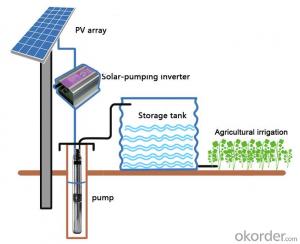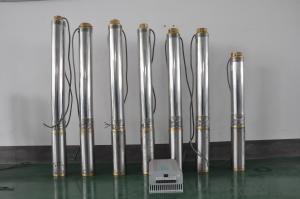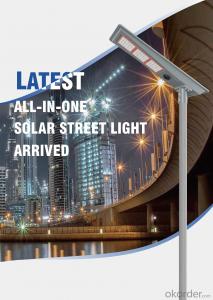Solar Irrigation Pump Solar Panel Water Pumps
- Loading Port:
- Shanghai
- Payment Terms:
- TT OR LC
- Min Order Qty:
- 1 set
- Supply Capability:
- 1000 set/month
OKorder Service Pledge
OKorder Financial Service
You Might Also Like
Solar Irrigation Pump Solar Panel Water Pumps
DC solar water pumping system consists of the motor, pump, controller, solar array and some other accessories, such as water level sensor, float switch, etc. Considered that storing water is more efficient than storing electricity, the system is designed to directly drive the pump without battery which can reduce the construction and operating cost and routine maintenance effectively.The PV array consists of multiple solar panels connected in series/parallel, which can supply the whole system as power source by converting the absorbed solar radiation energy to the electrical energy. The pump driven by a brushless DC permanent magnet motor draws water from deep-well or river. The pumped water is then fed into reservoir or water tank, or connected to the irrigation system or fountain system directly.
Advanced Technology
Applications Innovation
The efficiency of DC brushless permanent magnet motor has been increased up to 25% in comparison with traditional asynchronous motor.
Technology Innovation
Stator and rotor are sealed by environment friendly casting resin.Motor insulation resistance can be hold higher than 300MΩfor more than 10 years, which consumedly increased the security and reliability of the submersible motor.
Structure Innovation
Casting resign technology processed stator and rotor as well as the water lubricated bearing make the submersible pump environment friendly.
Feature
High Efficiency & High Reliability
DC Brushless Permanent Magnet Motor
Minimum Maintenance, long Service Life
Environment Friendly Materials, Lubricated Without Oil
Application
Village or Family Water Supply
Animal Drinking Water & Livestock Watering
Garden/Courtyard Irrigation
Swimming Pool
Water Supply for Bivouac or Camping Car
Water Supply for Remote Area
Automatic Control
Operate Automatically, No Need Watching
Maximum Power Point Tracking (MPPT)
Dry-run Protection
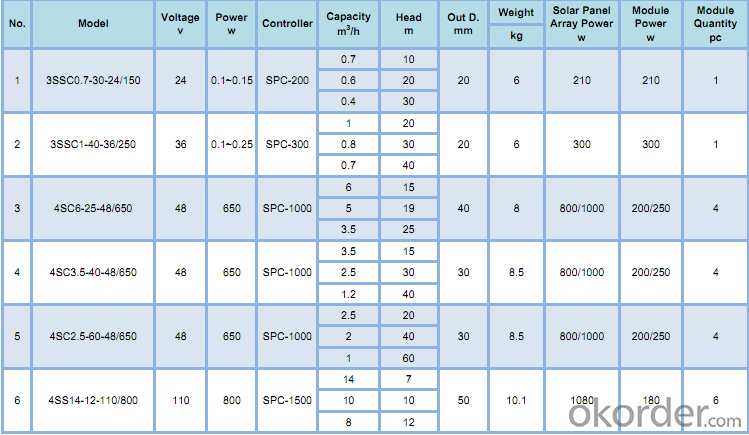
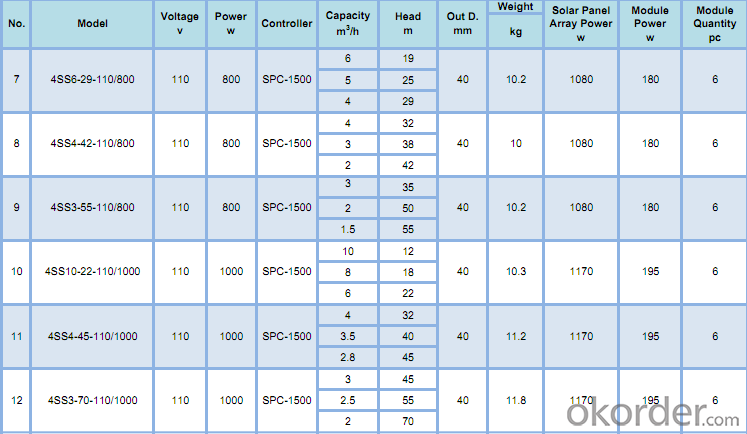
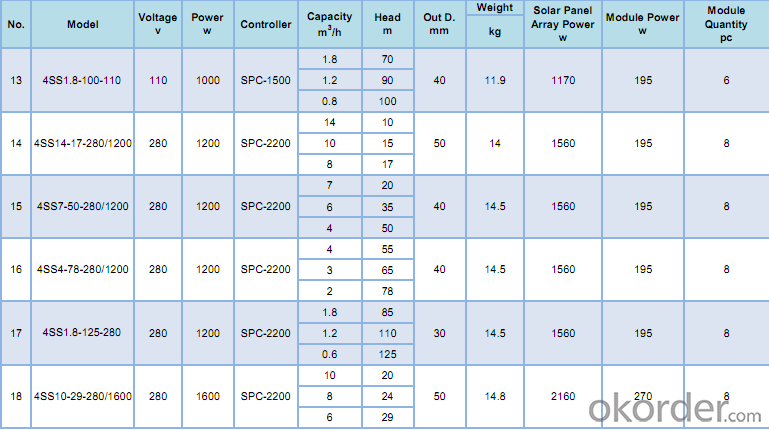
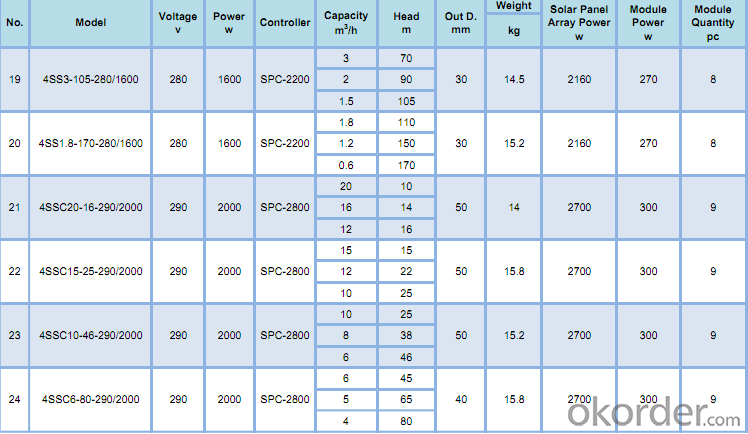
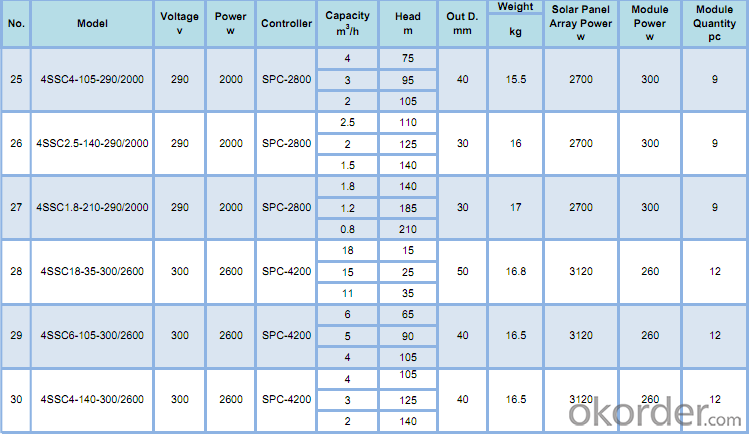
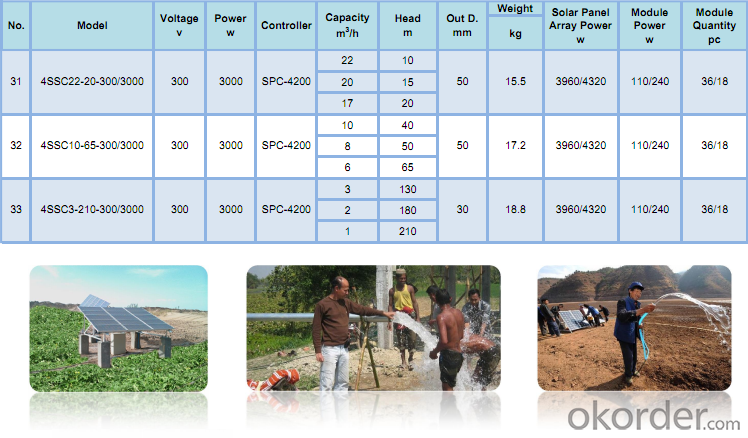
- Q:What is the expected energy consumption of a solar pump system over its lifetime?
- The expected energy consumption of a solar pump system over its lifetime can vary depending on several factors. Firstly, the efficiency of the solar panels used in the system plays a significant role in determining the energy consumption. Higher efficiency panels can generate more electricity from sunlight, reducing the overall energy consumption of the system. Secondly, the location and climate conditions where the solar pump system is installed also affect its energy consumption. Areas with abundant sunlight and consistent weather patterns can generate more energy from the solar panels, resulting in lower energy consumption over the system's lifetime. Additionally, the size and capacity of the solar pump system influence its energy consumption. A larger system with higher pumping capacity may require more energy to operate efficiently. Moreover, the maintenance and upkeep of the solar pump system can impact its energy consumption. Regular cleaning and maintenance of the solar panels, batteries, and other components ensure optimal performance, thereby minimizing energy consumption. Considering these factors, a well-designed and properly maintained solar pump system can have a relatively low energy consumption over its lifetime. It is important to consult with experts or manufacturers to determine the specific energy consumption estimates based on the system's specifications and location.
- Q:Can solar pumps be used for water supply in disaster-stricken areas?
- Yes, solar pumps can be used for water supply in disaster-stricken areas. Solar pumps are a reliable and sustainable solution that can provide a consistent and independent water supply even in areas with disrupted power infrastructure. They can be easily installed, require minimal maintenance, and operate using solar energy, making them ideal for disaster-affected regions where traditional power sources may be unavailable or unreliable.
- Q:Can a solar pump be used for wastewater management or treatment?
- Yes, a solar pump can be used for wastewater management or treatment. Solar pumps can be used to move wastewater from one location to another, such as from a septic tank to a treatment facility. They can also be used for agitating wastewater in treatment ponds or tanks, promoting the breakdown of organic matter. Solar pumps are a sustainable and cost-effective option for managing and treating wastewater in areas with limited access to electricity.
- Q:How durable are solar pumps?
- Solar pumps are highly durable and designed to withstand various weather conditions, including extreme heat, cold, and humidity. With no moving parts, they are resistant to wear and tear, making them reliable and long-lasting in terms of durability. Additionally, they require minimal maintenance, further contributing to their overall durability.
- Q:What is the expected lifespan of the motor used in a solar pump system?
- The expected lifespan of the motor used in a solar pump system can vary depending on factors such as the quality of the motor, maintenance practices, and environmental conditions. However, on average, a well-maintained motor in a solar pump system can be expected to last for around 10 to 15 years.
- Q:Can a solar pump be used in areas with limited access to water wells?
- Yes, a solar pump can be used in areas with limited access to water wells. Solar pumps rely on solar energy to power their operations, which means they don't require a connection to the electrical grid or traditional power sources. This makes them an ideal solution for remote areas where access to water wells may be limited or non-existent. Solar pumps can be used to extract water from various sources such as rivers, lakes, or even underground water bodies, providing a sustainable and reliable water supply in areas with limited access to traditional wells.
- Q:Can a solar pump be used for both irrigation and water supply?
- Yes, a solar pump can be used for both irrigation and water supply. Solar pumps are versatile and can be used to pump water for various purposes, including irrigating fields and supplying water for domestic or commercial use. They harness solar energy to power the pump, making them a sustainable and cost-effective option for both irrigation and water supply needs.
- Q:Can a solar pump be used to circulate water in a pond or lake?
- Yes, a solar pump can be used to circulate water in a pond or lake. Solar pumps are designed to harness energy from the sun to power their operation, eliminating the need for electricity or fuel. By utilizing solar energy, these pumps can effectively move water and create circulation in ponds or lakes, helping to improve water quality, prevent stagnation, and support aquatic life.
- Q:Can a solar pump be used in areas with limited access to water quality sensors?
- Yes, a solar pump can be used in areas with limited access to water quality sensors. While water quality sensors are helpful in monitoring and maintaining the quality of water, a solar pump can still be used to draw water from a source such as a well, borehole, or river. However, without water quality sensors, it would be challenging to continuously monitor the water for contaminants or impurities. It is advisable to regularly test the water using alternative methods or send samples for laboratory analysis to ensure its suitability for use.
- Q:What is the minimum sunlight requirement for a solar pump to function?
- The minimum sunlight requirement for a solar pump to function varies depending on the specific model and its efficiency, but in general, most solar pumps require a minimum of 4 to 6 hours of direct sunlight per day to operate effectively.
1. Manufacturer Overview |
|
|---|---|
| Location | |
| Year Established | |
| Annual Output Value | |
| Main Markets | |
| Company Certifications | |
2. Manufacturer Certificates |
|
|---|---|
| a) Certification Name | |
| Range | |
| Reference | |
| Validity Period | |
3. Manufacturer Capability |
|
|---|---|
| a)Trade Capacity | |
| Nearest Port | |
| Export Percentage | |
| No.of Employees in Trade Department | |
| Language Spoken: | |
| b)Factory Information | |
| Factory Size: | |
| No. of Production Lines | |
| Contract Manufacturing | |
| Product Price Range | |
Send your message to us
Solar Irrigation Pump Solar Panel Water Pumps
- Loading Port:
- Shanghai
- Payment Terms:
- TT OR LC
- Min Order Qty:
- 1 set
- Supply Capability:
- 1000 set/month
OKorder Service Pledge
OKorder Financial Service
Similar products
New products
Hot products
Hot Searches
Related keywords
